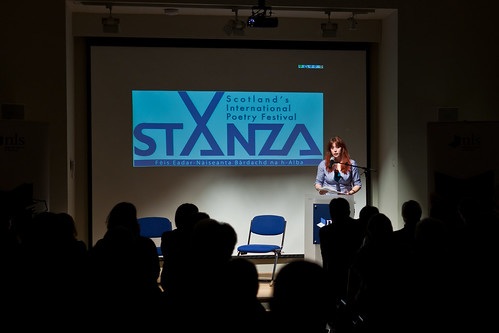You should read this: The Naming Of Cancer by Tracey S Rosenberg
Monday, January 19th, 2015The Naming of Cancer by Tracey S Rosenberg
Neon Books, 2014
I’m going to do a Dave Poems style disclaimer here and say that Tracey is someone I know well – she’s a fellow SBT New Writers Awards alumna and a fellow Shore Poet! I have also been following her work for a good few years now, since her novel, The Girl In The Bunker, was published by Cargo in 2011. Since then, she’s also published a debut poetry collection with Stewed Rhubarb, who specialise in giving performance poets a space on the page (that collection was called Lipstick Is Always A Plus – it was published in 2012 and comes highly recommended by me). She and I see each other pretty regularly at poetry events – usually, Tracey is kicking butt onstage and I am in the rapt audience. But I promise I did try to read The Naming Of Cancer (a slim pamphlet published in November last year by Neon) with an open mind and a critical eye.
This is a skinny wee collection weighing in at just fourteen poems, none of which go over a page – but they’re poems that really pack a punch. The book follows the myriad journeys that people go on when their lives are affected by cancer – I say affected, because there are poems in here from the point of view of partners, offspring, friends and doctors as well as poems more directly about the patient herself. This is one of the pamphlet’s great strengths. By looking at this devastating subject from many different angles, it avoids many of the potential pitfalls that come with writing about sickness and human mortality: it avoids melodrama and sentimentality, and steers also steers clear of motivational, life-is-short cliché. It’s a poetry collection that says it like it is.
Take, for example, ‘The Oncologist’s Nightmare,’ a poem that pops up to mess with your expectations just as you’re feeling “settled in.” This poem – in which the oncologist replays all of the frightened and angry questions that have been thrown at them that day – is a stark reminder that doctors’ lives are also affected by exposure to terrible illness, albeit in a slightly different way.
A couple of pages later, ‘Touch’ examines the strange and intimate relationship between doctor and patient. This small poem of only seventeen lines pulls into its clever web the doctor, who must work with extreme care as he invades the patient’s privacy; the patient’s lover, recalling his own worries that “she might find him intrusive” when he touches her; and finally the patient herself, waiting for “the blade: it will remove her.”
Several of these poems deal with the more mundane aspects of living with and alongside cancer: the fearful boredom of waiting around in hospitals is captured beautifully by repeated references to hospital trappings: “a six-bed ward,” vending machines and posters in faceless corridors. This sense of constant and perhaps doomed repetition is also captured in the form of several of the poems: the opening poem is a villanelle in which “needles plunge” in almost every stanza, and elsewhere, echoes and refrains abound.
The book opens with a snippet from TS Eliot’s Four Quartets (“East Coker,” to be precise), and there’s something rather Eliotean about the whole thing – I don’t think it’s a coincidence that “Cancer Vilanelle,” the opening poem, comes hot on the heels of that epigraph with its refrain, “consultants come and go.” Certainly, many of these poems exist in a space of isolation, fear and decay that calls to mind the anguish of Prufrock.
The Naming Of Cancer is not a cheery read, but it is by no means depressing or hopeless. Rather, this is a collection in which hope is faint and distant, but not gone. For example, in the final poem, “Bait,” the scraps of a dead body are used as bait on a fisherman’s hook. It’s a stark and violent image, but there is the promise of goodness in it: the body is not only still useful, not only luring a new, live catch. It is also being “restore[d] to the ravenous sea” – a thought that, after the long, grey corridor of illness, seems truly comforting.
The Naming Of Cancer is available from neonbooks.org.uk for the bargainous price of just £4.
*
Like shiny things? Check out Edinburgh Vintage, a totally unrelated ‘sister site’ full of jewels, treasures and trinkets. If you want to get in touch you can follow OneNightStanzas on Twitter, or email claire[at]onenightstanzas.com. I reply as swiftly as I can!

